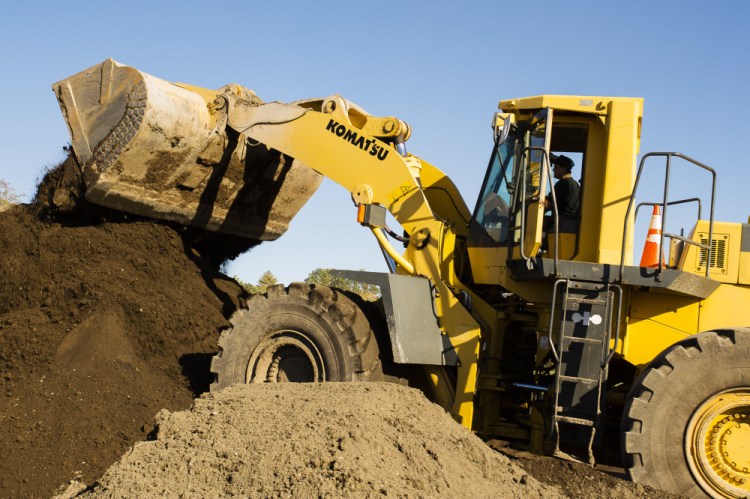Environmental regulators intend to revoke the licenses of an Arundel composting company accused of producing noxious odors, polluting a local stream and obstructing state inspectors.
Maine Environmental Protection Commissioner Paul Mercer issued notice last month to Dubois Livestock and Excavating Inc., informing the farm and earthwork operation on Irving Road that the department intended to pull the company’s three compost licenses.
The notice followed attempts the department says it made for over a year to get Dubois to fix more than two dozen environmental rule violations outlined in three separate notices issued to the company in 2017.
The state alleges that Dubois’ flawed composting operation emitted foul smells across the neighborhood, produced compost that contained salmonella, leached polluted runoff into a nearby stream and accepted fish sludge in violation of its permits.
The agency further alleges that Dubois staff barred inspectors from entering its property and denied record requests.
Company President Randy Dubois rejected the state’s allegations in a written statement Tuesday.
“Dubois Livestock responsibly produces … environmentally important compost materials that are highly regarded by our customers. We have repeatedly requested meetings with the DEP so that we may address any and all concerns the DEP may have and assure the DEP of our commitment to the environment,” Dubois said. “For reasons we do not understand, the DEP has refused to meet.”
Mercer, in his August notification, said his department’s concerns are detailed in multiple violation notices.
Department staff outlined issues during a meeting with Dubois and an attorney last year and the Dubois company provided a consultant report in July that has more evidence of runoff issues but “contains no detailed information for the Department to consider, and completely ignores the numerous other outstanding violations outlined in the previous (violation notices),” Mercer said.
Dubois has requested a public hearing on its license revocation. Parties that want to intervene in the case have until Oct. 5 to submit petitions to the department. A hearing date has not been set.
The company “will present the facts at a public hearing instead,” Randy Dubois said. “We are confident those facts will demonstrate that our composting operation is carried out without damaging the environment. In fact, agricultural composting operations such as ours enhance the environment – as well as enhancing the farms and gardens of southern Maine.”
Dubois is permitted to receive up to 8,000 tons of residual waste, including fish and shellfish, and 21,000 tons of materials such as horse and cow manure, horse bedding and wood chips.
There are 24 Maine composting companies that accept food and fish waste and 21 that take sludge and biosolids, according to DEP spokesman David Madore.
The department has not revoked any composting licenses in the past 10 years, Madore said.
The Dubois company has for years faced odor complaints from neighbors and repeated state environmental investigations as well as zoning challenges from the town of Arundel.
Dubois staff members in 2015 told the Portland Press Herald the smell came from a mixture of compost and chicken manure spread on their fields.
The DEP, in a violation notice sent last June, said testing in 2015 and 2016 showed Dubois’ compost was not processed at a high enough temperature, contributing to the noxious odors. A laboratory test in 2016 showed the company’s compost had levels of salmonella bacteria above permitted limits.
All of those factors contributed to foul odors that wafted into nearby communities, a violation of a rule that compost operations must prevent nuisance odors at nearby occupied buildings.
The department was delayed from inspecting the facility because Dubois stopped its staff from going on the property. The state got permanent access with an injunction order upheld by the Maine Supreme Judicial Court last December. In another site visit, Dubois employees refused to answer inspectors’ questions.
In 2017, a spill of fish sludge in Kennbunk again drew regulators’ attention to the Dubois operation. The company was charged by Kennbunk police for operating with an unsecured load that spilled onto Alfred Road. Department staff questioned if Dubois was accepting liquid waste in violation of its permit and asked to inspect future deliveries. Dubois denied the request, according to the June violation notice.
A second notice, in August 2017, charged that a faulty leachate system was disposing fluids into a nearby waterway, a tributary of Swan Pond Brook. Inspectors in May 2017 smelled a sulfurous odor and visible white fibrous growth in the discharge area and stream tributary indicating polluted discharge in the stream flowing north of Dubois’ operation.
Dubois was cited again last October for nuisance odors after inspectors received 32 complaints about smell over the previous three months.
Department officials have demanded that Dubois stop distributing compost, stop leaching waste into nearby streams, turn records over to the department, and last August, halt all composting and develop a closure plan.
In his letter to Dubois this August, Commissioner Mercer said only one of the seven corrective actions demanded by the department was “partially implemented.” The DEP declined to say which action Mercer referred to.
Send questions/comments to the editors.



